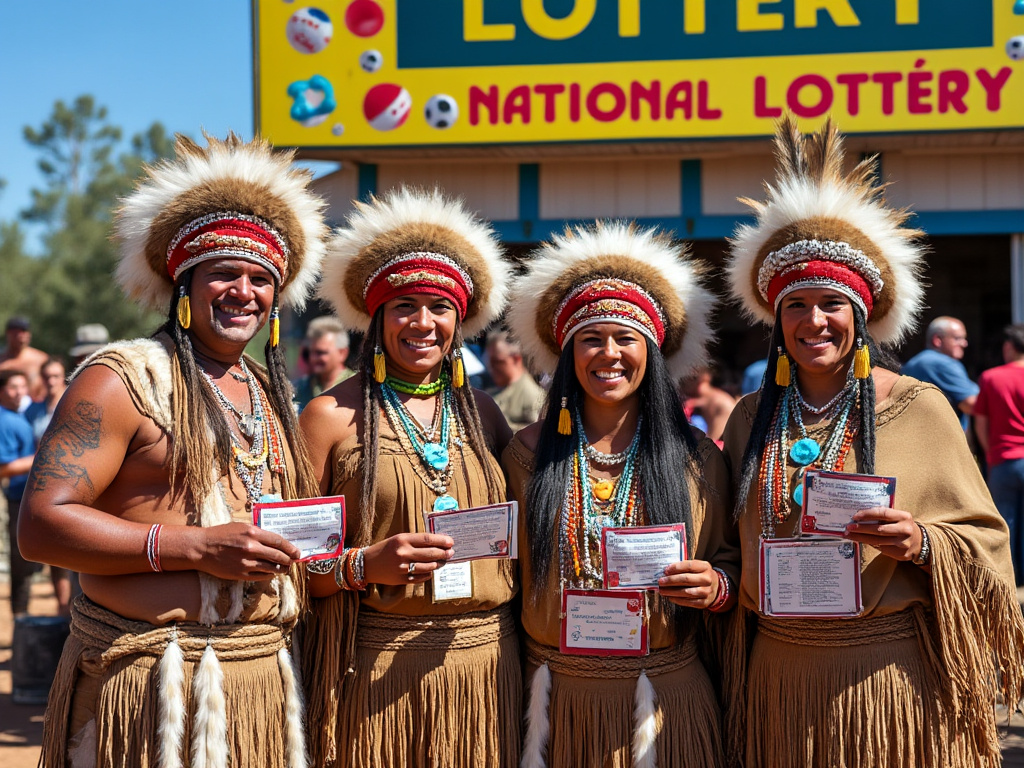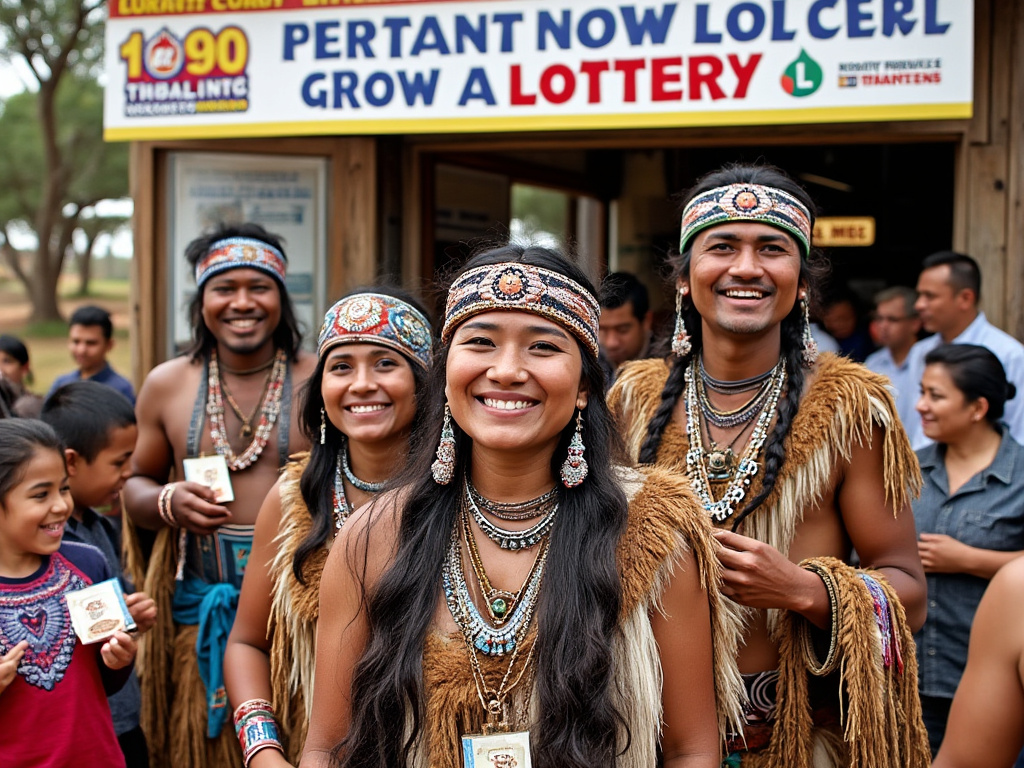Historic Milestone: Indian Tribe to Operate National Lottery Game for Economic Sovereignty
컨텐츠 정보
- 460 조회
- 목록
본문

The decision to entrust a national lottery game to an Indian tribe marks a transformative event in the U.S. gaming landscape, blending economic development with the advancement of Indigenous sovereignty. This pioneering move extends tribal economic engagement beyond reservation lands, promising new avenues for financial autonomy and setting a precedent for Indigenous participation in large-scale gaming.
For tribal communities across the country, this initiative represents more than a business opportunity; it is a bold assertion of tribal governance and economic empowerment. Let’s explore the history of tribal gaming, the path to this breakthrough, and its potential impact on both tribal and non-tribal communities.
The Evolution of Tribal Gaming in the U.S.: A Foundation of Sovereignty
Understanding the significance of a tribal-operated national lottery requires a look back at the history of tribal gaming. Since the 1980s, gaming has been pivotal for Indigenous economic independence, taking root with the 1988 Indian Gaming Regulatory Act (IGRA). This landmark law allowed tribes to establish gaming operations on their lands, providing a critical revenue stream for self-sufficiency. Funds from gaming have supported healthcare, education, housing, and infrastructure development on tribal lands.
For many tribes, casinos and smaller gaming enterprises have served as a lifeline, generating employment, income, and vital services for community members. However, tribal gaming has largely been limited to reservation land due to legal restrictions. A national lottery represents a new chapter in this story, marking the first time a tribe will run a game that reaches beyond state and regional borders.
The Path to Managing a National Lottery: Empowering Tribal Sovereignty
The road to a tribal-run national lottery involved years of advocacy from tribal leaders who have long sought expanded recognition of tribal sovereignty. Securing this venture required negotiation with state and federal entities and overcoming numerous regulatory barriers. Now, by stepping into the national lottery arena, this tribe will harness the expertise and experience it has developed in managing on-reservation gaming operations.
Through this endeavor, the tribe affirms its capacity for complex business operations, challenging outdated notions about the scope of Indigenous governance. The tribe’s leadership in managing a national enterprise sets a powerful example for self-determination, as it engages in an industry that has historically excluded Indigenous communities from high-stakes roles. It signals the ability and readiness of tribal nations to navigate modern economic landscapes, shifting perceptions about the capabilities and influence of Indigenous peoples in the business world.
Economic Impact: Generating Revenue and Enhancing Community Well-being
For the tribe, managing a national lottery is expected to provide substantial financial benefits. Revenues will circulate back into the community, funding critical sectors like healthcare, education, housing, and infrastructure. By fostering a stable source of income, the tribe is empowered to reduce dependency on external funding sources and forge a path toward economic independence.
This economic shift could also address some of the long-standing economic challenges facing tribal communities, particularly those in rural or under-resourced regions. Employment opportunities, increased funding for public services, and sustainable income sources could greatly improve quality of life, helping alleviate issues like poverty, limited job prospects, and insufficient public resources. The anticipated financial influx may contribute to a more stable and prosperous future for Indigenous communities across the country.
Cultural and Social Implications: Honoring Heritage Through Enterprise
While economic gains are significant, the tribe’s role in this national lottery game carries profound cultural and social implications. As the first Indigenous entity to manage a nationwide gaming operation, the tribe can incorporate cultural values into its business model, creating a unique enterprise that reflects tribal ethics and priorities. For instance, marketing materials could celebrate Indigenous culture, and lottery funds could support language revitalization programs, cultural education, and traditional arts.
This cultural approach to gaming not only preserves heritage but strengthens community identity. Lottery proceeds could support youth engagement initiatives, helping the next generation connect with their heritage. Moreover, the tribe’s leadership on a national scale fosters pride and unity, inspiring other Indigenous communities to envision their potential role in large-scale economic ventures. This historic milestone encourages broader recognition of Indigenous values and traditions as guiding forces in business.
Expanding Tribal Sovereignty in the Gaming Industry
This initiative signifies an important step toward sovereignty, exemplifying the tribe’s authority over its economic ventures. Traditionally, the gaming industry has been dominated by non-Indigenous enterprises, with limited representation of tribal nations. By claiming a prominent role, the tribe sets an example for other Indigenous communities interested in scaling their business efforts nationally.
The national lottery also serves as an inspiration for tribal communities across the country. By entering this competitive industry, the tribe is shifting the narrative around tribal sovereignty, illustrating how Indigenous governance extends into economic domains once monopolized by external forces. This expansion of sovereignty could drive further efforts among tribes to develop enterprises beyond traditional borders, empowering them to define their economic futures on a broader scale.
Legal and Regulatory Hurdles: Navigating Complex Compliance Frameworks
Establishing a national lottery game has required intensive collaboration with federal, state, and tribal regulatory bodies. The gaming landscape in the United States is marked by complex and stringent rules, including a web of federal and state laws governing lotteries. For tribes, the challenge is even greater, as regulations vary widely by state, creating additional barriers to cross-border business.
The tribe’s successful navigation of these regulatory hurdles speaks to its tenacity and strategic acumen. This venture has involved working closely with state governments, the U.S. Department of the Interior, and other regulatory agencies to ensure compliance. By overcoming these legal challenges, the tribe paves the way for other Indigenous enterprises to explore national-scale opportunities, helping redefine the boundaries of tribal economic involvement.
Anticipating Positive Social Impact Beyond Tribal Lands
While the primary beneficiaries of the lottery will be tribal communities, non-tribal populations may also experience positive impacts. Historically, lottery funds have supported public services like education, infrastructure, and social programs. This national lottery allows players to support a mission that benefits Indigenous prosperity and helps bridge social gaps.
Additionally, the tribe’s high-profile role in the national lottery could raise awareness about Indigenous issues and achievements, fostering greater understanding and respect among non-Indigenous Americans. Through marketing campaigns, media coverage, and public engagement, the tribe has an opportunity to educate the public about its culture and history, reshaping mainstream perspectives on Indigenous communities.

Responsible Gaming: Upholding Ethical Standards
Despite the benefits, lotteries and other forms of gaming carry potential risks, such as addiction and financial strain. Acknowledging these concerns, the tribe has committed to implementing responsible gaming practices. Its plans include setting up hotlines, educational resources, and tools for players to manage their gambling behavior, aligning with the tribe’s cultural commitment to community well-being.
By prioritizing responsible gaming, the tribe can protect vulnerable players while enhancing its reputation as an ethical gaming operator. These safeguards not only align with best practices but also reinforce the tribe’s dedication to creating a gaming experience that prioritizes the welfare of its players and community.
A Model for Future Partnerships and Indigenous-Led Ventures
This national lottery could serve as a model for future collaborations between tribal and non-tribal entities in the gaming industry. The tribe’s success demonstrates that Indigenous communities can manage large-scale gaming operations, which could inspire other organizations to seek partnerships with tribes in the gaming sector and beyond.
As more states consider expanding gaming options to address budget shortfalls, this tribal lottery model offers a viable alternative, providing revenue streams for both state services and Indigenous communities. In line with trends in socially responsible gaming, where proceeds are directed toward community projects, this model champions fairness, equity, and cultural inclusivity. The tribe’s leadership may encourage future initiatives that emphasize ethical principles, shared economic benefits, and cross-cultural respect.
Conclusion: A New Era of Tribal Sovereignty and Economic Empowerment
This historic move toward a national, tribe-operated lottery game represents a watershed moment in the evolution of tribal sovereignty. By assuming control over a nationwide gaming operation, the tribe asserts its place in the economic sphere, challenging stereotypes and illustrating the vast potential of Indigenous self-determination.
The tribe’s pioneering role exemplifies resilience and adaptability, marking a pivotal shift in the trajectory of Indigenous economic development. The national lottery game serves as a symbol of progress and hope, representing the strength and vitality of tribal nations. For both Indigenous and non-Indigenous communities, this venture underscores the power of partnership, respect, and cultural integrity in building a future that honors diversity and promotes shared prosperity.



 LV.
50
LV.
50


 276,115
P
276,115
P


 240,275
P
240,275
P



